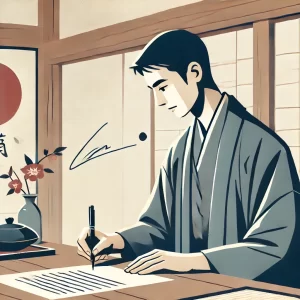いのちの名前 [Inochi no Namae]
木村 弓 [KIMURA Yumi]
Words : 覚 和歌子 [KAKU Wakako]
Music : 久石 譲 [HISAISHI Jō]
Following yesterday’s “Always With Me“, today I would like to introduce “The Name of Life”, the theme music from Studio Ghibli‘s anime film “Spirited Away web“. (“千と千尋の神隠し / Sen to Chihiro no Kamikakushi / Le Voyage de Chihiro / Chihiros Reise ins Zauberland / El viaje de Chihiro etc. “)
Let me say upfront that today’s article has a lot of digressions before I explain the lyrics. But I assure you that there is a lot of important information, so I hope you enjoy reading without skipping.
Many people know the name of Studio Ghibli and its representative, Hayao Miyazaki. Joe Hisaishi is the composer who has worked on the music for most of Miyazaki’s films. Hisaishi’s music is indispensable to Ghibli films, and except for theme songs with lyrics like “Always With Me,” the in-film music is entirely composed by Hisaishi.
“The Name of Life” was originally an instrumental piece composed by Hisaishi for the film, but Wakako Kaku wrote lyrics for it, and Yumi Kimura sang it. Although it wasn’t used in the film itself, the song was released on a CD.

“Spirited Away” has different titles in various countries, but the original title is “千と千尋の神隠し / Sen to Chihiro no Kamikakushi”. Those who have seen the film will understand that the main character, The protagonist, “千尋 / Chihiro” is renamed “千 / Sen” by her employer, the witch “湯婆婆 / Yubaba”, who says her original name is too luxurious. The film’s title, “Sen to Chihiro no Kamikakushi” (=The Spiriting Away of Sen and Chihiro), includes both names.
The scene where Chihiro’s name is taken is very memorable. Additionally, the climax of the film features the character “ハク / Haku” remembering his real name. One of the film’s main themes is the loss and recovery of identity. But, I think understanding this only through the film might be a bit difficult for overseas audiences . Therefore, I will try to explain the necessary concepts as simply as possible.
In Japan, there is a religious belief that a person’s real name is connected to their spiritual identity. This is a cultural aspect of East Asia, including China. Most modern Japanese people are not consciously living with this idea, and few even know about it, but there are several examples where names are considered very important.
For noble people who have both a real name and a common name, there was a custom of avoiding saying the real name out of respect. This can also be seen in other religious cultures, but in modern Japan, it is customary not to say the emperor’s name, simply referring to him as “Tenno” (=the Emperor).
Also, in Japan, misreading a person’s name is considered a relatively serious mistake. My surname is somewhat unusual, and people often misread it, but they apologize seriously each time. Although I don’t mind it!
Therefore, in the film, Yubaba taking Chihiro and Haku’s names symbolizes her holding their lives. The signed contract with its binding force can be understood as having a mysterious religious power rather than just a legal effect.
So, this was a story about the importance of names. The song “The Name of Life” is the theme song for the scene where Haku remembers his real name and regains his identity.

- 命(いのち)[inochi] : life
- 名前(なまえ)[namae] : name
“Name” in Japanese is “namae.” Don’t you think they look similar? “Namae” is the Hepburn romanization, and the pronunciation is completely different, but the similarity in spelling is almost miraculous! Of course, Japan did not import the word “name.” Since we’re at it, let’s have even non-Japanese learners remember a self-introduction phrase today.
わたしの名前はちひろです。[Watashi no namae wa Chihiro desu.]
“My name is Chihiro.”
青空に線を引く
aozora ni sen o hiku
ひこうき雲の白さは
hikōki kumo no shirosa wa
ずっとどこまでも ずっと続いてく
zutto doko made mo zutto tsuzuite ku
明日を知ってたみたい
ashita o shitteta mitai
- 青空(あおぞら)[aozora] : blue sky
- 線(せん)[sen] : line
- 引く(ひく)[hiku] : pull, draw
- 飛行機雲(ひこうきぐも)[hikōkigumo] : contrail
- 白い(しろい)[shiroi] : white
- ずっと [zutto] : always
- どこまでも [doko made mo] : endlessly
- 続く(つづく)[tsuzuku] : continue
- 明日(あした)[ashita] : tomorrow
- 知る(しる)[shiru] : know
(translation) “Drawing a line in the blue sky,
The whiteness of the contrail,
Keeps going on forever,
it seems to know tomorrow.”
By the way, “白 / shiro” (=white) can also be read as “haku.” The name of the character Haku, depicted as a white dragon in the film, also carries the meaning of “white.”
胸で浅く息をしてた
mune de asaku iki o shiteta
熱い頬 さました風も おぼえてる
atsui hō samashita kaze mo oboeteru
- 胸(むね)[mune] : chest
- 浅い(あさい)[asai] : shallow
- 息(いき)[iki] : breath
- 熱い(あつい)[atsui] : hot
- 頬(ほお)[hō] : cheek
- 冷ます(さます)[samasu] : cool
- 風(かぜ)[kaze] : wind
- 覚えている(おぼえている)[oboeteiru] : remember
(translation)
“Breathing shallowly in my chest,
I remember the wind that cooled my hot cheeks.”
This describes someone who seems unwell. In the film, it might be depicting the time when Chihiro nearly drowned in a river as a child but was barely saved.

未来の前にすくむ手足は
mirai no mae ni sukumu teashi wa
静かな声にほどかれて
shizukana koe ni hodokarete
叫びたいほど なつかしいのは
sakebitai hodo natsukashii no wa
ひとつのいのち 真夏の光
hitotsu no inochi manatsu no hikari
あなたの肩に 揺れてた木漏れ日
anata no kata ni yureteta komorebi
- 未来(みらい)[mirai] : future
- 前(まえ)[mae] : before
- すくむ [sukumu] : cower
- 手(て)[te] : hand
- 足(あし)[ashi] : foot
- 静か(しずか)[shizuka] : quiet
- 声(こえ)[koe] : voice
- ほどく [hodoku] : unravel
- 叫ぶ(さけぶ)[sakebu] : shout
- なつかしい [natsukashii] : nostalgic
- ひとつ [hitotsu] : one
- 命(いのち)[inochi] : life
- 夏(なつ)[natsu] : summer
- 光(ひかり)[hikari] : light
- あなた [anata] : you
- 肩(かた)[kata] : shoulder
- 揺れる(ゆれる)[yureru] : sway
- 木漏れ日(こもれび)[komorebi] : sunlight filtering through trees
(translation) “My hands and feet cower before the future,
Unraveled by a quiet voice.
What is nostalgic enough to make me want to shout,
Is a single life, midsummer light,
The sunlight filtering through the trees swaying on your shoulder.”
つぶれた白いボール
tsubureta shiroi bōru
風が散らした花びら
kaze ga chirashita hanabira
ふたつを浮かべて 見えない川は
futatsu o ukabete mienai kawa wa
歌いながら流れてく
utainagara nagareteku
- 潰れる(つぶれる)[tsubureru] : crush
- ボール [bōru] : ball
- 風(かぜ)[kaze] : wind
- 散らす(ちらす)[chirasu] : scatter
- 花びら(はなびら)[hanabira] : petal
- ふたつ [futatsu] : two
- 浮かべる(うかべる)[ukaberu] : float
- 見えない(みえない)[mienai] : invisible
- 川(かわ)[kawa] : river
- 歌う(うたう)[utau] : sing
- 流れる(ながれる)[nagare] : flow
(translation) “A crushed white ball,
Petals scattered by the wind,
Floating these two, the invisible river
Flows while singing.”
It makes one wonder what the “invisible river” means. The river Chihiro once drowned in no longer exists, so it might be invisible.
秘密も嘘も喜びも
himitsu mo uso mo yorokobi mo
宇宙を生んだ神さまの 子供たち
uchū o unda kamisama no kodomotachi
- 秘密(ひみつ) [himitsu] : secret
- 嘘(うそ) [uso] : lie
- 喜び(よろこび) [yorokobi] : joy
- 宇宙(うちゅう) [uchū] : universe
- 生む・産む(うむ) [umu] : give birth
- 神(かみ) [kami] : god
- 子供達(こどもたち) [kodomotachi] : children
(translation) “Secrets, lies, and joys,
The children of the god who created the universe.”
In Japan, the word “神 / kami” (=god) is often used without deep meaning. Here, it might simply refer to the general image of a god.
However, in the film, gods are depicted quite seriously. The main religions widely believed in Japan are Buddhism, which originated in India, and Shinto wiki, which is indigenous to Japan. The gods in the film are Shinto gods. Shinto is polytheistic, so many unique gods appear in the film.
Haku’s real name, “ニギハヤミコハクヌシ / Nigihayami Kohakunushi” has a model god, but Japanese mythological gods have unusually long names without surnames. These are ancient Japanese names before the influence of China.
未来の前にすくむ心が
mirai no mae ni sukumu kokoro ga
いつか名前を思い出す
itsuka namae o omoidasu
- 心(こころ) [kokoro] : heart
- いつか [itsuka] : someday
- 思い出す(おもいだす) [omoidasu] : recall
(translation) “The heart that cowers before the future
Will someday remember its name.”
叫びたいほど いとおしいのは
sakebitai hodo itoshii no wa
ひとつのいのち 帰りつく場所
hitotsu no inochi kaeritsuku basho
わたしの指に 消えない夏の日
watashi no yubi ni kienai natsu no hi
- 叫ぶ(さけぶ) [sakebu] : shout
- いとおしい [itoshii] : dear
- 帰る(かえる) [kaeru] : return
- 場所(ばしょ) [basho] : place
- 指(ゆび) [yubi] : finger
- 消える(きえる) [kieru] : disappear
- 夏(なつ) [natsu] : summer
- 日(ひ) [hi] : day
(translation) “What is dear enough to make me want to shout,
Is a single life, the place to return to,
The summer day that doesn’t disappear from my fingers.”
The phrase “from my fingers” requires some thought. Well… Perhaps it’s a residue from the time Chihiro nearly drowned, or it might be a current memory of Haku for her. We don’t always have to find the answer within the movie’s storyline, so it’s okay not to overthink it.
The last “夏の日 / natsu no hi” (=summer day) evokes a sense of loss and nostalgia, much like the final scenes of the movie.
It was a very beautiful lyrics and music.
Please listen to the cover versions as well. In 2005, Ayaka Hirahara covered it. On the 2023 Ghibli tribute album, Lilas Ikuta from the popular group Yoasobi also covered it. Lilas Ikuta goes by the name “ikura” when performing with Yoasobi, seemingly using both her real name and a common name.
YouTube Search ” The Name of Life “
Thanks for reading! Feel free to comment if you have any feedback or questions.
Follow me on X.



